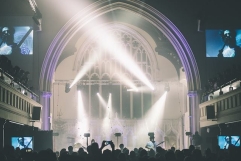Four in 10 people in England do not realise Jesus was a real person who actually lived, according to new research.
Two-thirds of practising Christians said they had talked about Jesus to a non-Christian in the past month and more than seven in 10 said they felt comfortable talking about Jesus to a non-Christian. The words most often used to describe Jesus were "spiritual", "loving" and "peaceful".
Christians from the millennial cohort, aged between 18 and 34, talked about Jesus most often.
Nearly six in 10 of the English population identify as Christian but fewer than one in ten are practising, in terms of praying and reading the Bible regularly and going to church at least once a month.
The survey of more than 2,500 adults surveyed by Comres and the Barna group found the West Midlands had fewest practising Christians and the south-east had most.
The survey also suggested Christians who spoke to non-Christians about their faith did not always get a positive response. The study, commissioned by the Evangelical Alliance and the Church of England, found nearly six in 10 did not want to know more about Jesus. Just one fifth wanted to know more about Jesus Christ after a practising Christian shared their faith with them.
Nearly half of non-Christians said they were "not open" to an experience or encounter with Jesus and nearly one-third actually felt uncomfortable. More than a quarter felt more negative towards Jesus after a Christian shared their faith with them.
The report says: "We must recognise here that even Jesus himself when speaking to people in the first century was not well-received 100 per cent of the time." The report, published in advance of the General Synod of the Church of England later this month, recommends prayers for the Church. "We are face with an enormous challenge but also great opportunities," it says. The study has been sent to all 470 bishop, clergy and laity members of the synod, newly elected for the next five years.
The Queen will inaugurate the synod in Westminster Abbey before the two-day meeting begins. One of the most important debates will be on migration and the refugee crisis. The synod will debate the British contribution to the resettlement effort, and how to signal concern for displaced Christians while making clear that refugees of all faiths must be helped.















